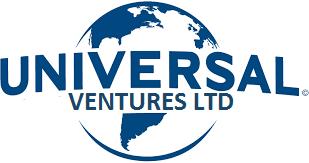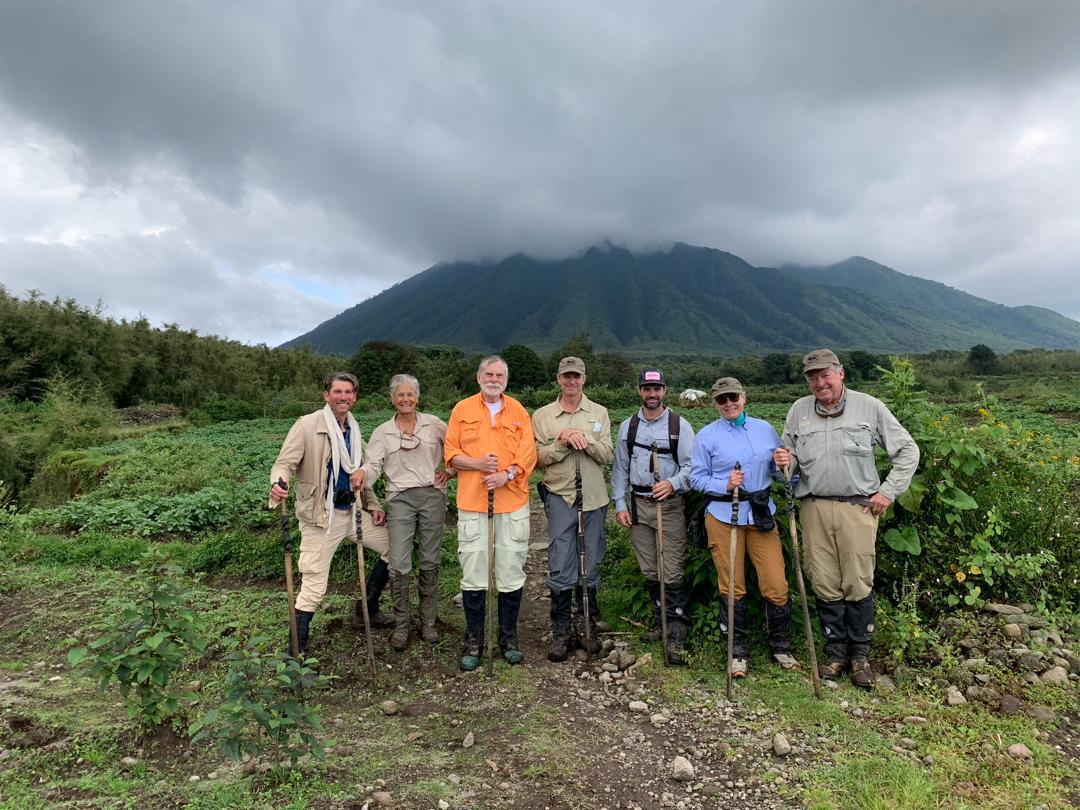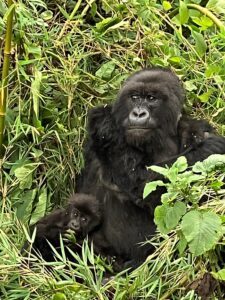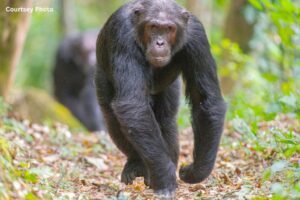Planning a trip to the Land of a Thousand Hills and curious about how Safari Rwanda prices will shape your travel budget in 2025–2027? Understanding Safari Rwanda prices is essential for anyone preparing for gorilla treks, wildlife safaris, and cultural adventures. This comprehensive guide breaks down what truly influences Safari Rwanda prices, how to make your safari affordable without sacrificing quality, and what to expect specifically from gorilla trekking permit fees—firmly set at $1,500 per person in Rwanda. Whether you’re a family, small group, or first-time explorer, consider this your clear, practical roadmap to plan wisely and spend confidently on your Rwandan safari.
Gorilla Trekking Permit Costs (2025–2027)
The official Rwanda gorilla trekking permit remains fixed at $1,500 per person, granting one unforgettable trek and an exclusive hour with a habituated gorilla family in Volcanoes National Park. This permit is a major component of Safari Rwanda prices, directly funding vital conservation projects and local community programs. It is non-negotiable, highly limited, and often the largest cost in any Rwanda safari itinerary—proof of Rwanda’s commitment to responsible tourism.
Key notes:
-
Ages 15+ only for gorilla trekking.
-
Permits are date-specific and non-transferable once issued.
-
Peak dates (June–September, December–February) sell out months in advance.
-
You can pair gorillas with golden monkey trekking, Dian Fossey hike, or cultural visits to diversify your experience (and spread value across your trip).
-
Tip: If you’re traveling with kids under 15, swap gorilla trekking for golden monkeys, easy forest walks, or community experiences to keep the whole family engaged—while adult travelers trek.
What Drives Safari Rwanda Prices ?
1) Lodging Category & Location
Your accommodation style shapes overall spend more than anything besides the gorilla permit.
-
Budget: Clean guesthouses and simple lodges, often outside park gates.
-
Midrange: Comfortable en-suite rooms, good food, reliable service, great value for families.
-
Luxury: Boutique lodges and high-end camps with prime locations, gourmet dining, spa, private decks, and immersive guiding.
2) Permits & Park Activities
Beyond gorillas ($1,500), plan for optional permits and fees:
-
Golden Monkey trekking (Volcanoes)
-
Chimpanzee tracking & Canopy Walk (Nyungwe)
-
Night drives, boat cruises, guided walks (Akagera)
Selecting 2–3 headline activities keeps the trip exciting without over-packing your budget.
3) Transport & Vehicle Type
Rwanda’s parks are spread across scenic hills, so safe, comfortable transport matters:
-
Shared 4×4 in small groups reduces per-person cost.
-
Private 4×4 with driver-guide offers flexibility for families (nap breaks, photo stops, kid-friendly pacing).
-
Fuel and road time increase with multi-park routes—optimize your loop to save.
4) Guiding Quality
Professional, English-speaking driver-guides are worth their weight in gold: better wildlife sightings, smoother logistics, cultural context, and safety. Great guiding elevates a good trip into a fantastic one.
5) Seasonality
-
Dry seasons (June–Sept, Dec–Feb): Best weather, highest demand.
-
Green seasons (Mar–May, Oct–Nov): Lusher vistas, fewer crowds, stronger value on rooms and some activities.
6) Group Size & Rooming
Families and small groups share transport, guiding, and some fixed costs—the single best lever to reduce per-person spend without sacrificing quality.
Budget, Midrange, or Luxury—Which Delivers Best Value in Safari Rwanda Prices ?
-
Budget: Ideal for travelers who prioritize activities over lodge frills. Expect simpler rooms and longer drives to reach park gates. Great for student groups and adventure-first families.
-
Midrange: The sweet spot for families and small groups—comfortable rooms, good food, strategic locations, and solid service. Balances cost and convenience.
-
Luxury: When you want prime locations, exceptional cuisine, spa time, private decks with volcano views, and top naturalist guides. Best for milestone trips and low-stress logistics.
-
Planning hack: If you’re torn, mix categories—choose midrange in Kigali/Akagera and splurge on one or two nights near Volcanoes National Park for convenience around your gorilla trek.
When to Travel for the Best Value, Safari Rwanda Prices
-
Best wildlife + trekking weather: June–September, December–February.
-
Best savings: March–May and October–November (green seasons) when many properties run value-adds (complimentary activities, stay-pay specials, or family room upgrades).
-
School holidays: Book 6–9 months ahead for June–August and Christmas/New Year. Gorilla permits sell out first.
Cost Composition , Safari Rwanda Prices Average
While totals vary by lodge category and activities, families and small groups can think in proportions (not prices):
-
Permits & park fees: ~35–50% (gorillas dominate this share)
-
Lodging: ~25–40% (location and category drive variance)
-
Transport & guiding: ~15–25%
-
Meals, logistics & incidentals: ~5–10%
-
Translation: To keep Safari Rwanda prices manageable, decide first on permits (must-do activities), then lock midrange lodges close to park gates, and share private transport in a small group.
Family & Small-Group Savings (Without Cutting Quality)
-
Share a private 4×4. The per-person rate drops quickly from 2 to 4+ guests.
-
Cluster your highlights. Plan gorillas + golden monkeys on consecutive days; keep transfers short.
-
Choose family rooms or triples. Often cheaper than booking two separate rooms.
-
Build rest windows. Fewer moving days = fewer logistics costs (and happier kids).
-
Use one expert outfitter. One planner = optimized routing, fewer duplicate costs.
Hidden & Optional Costs to Plan For Safari Rwanda Prices
-
Visas: Check your nationality; many pay on arrival or online.
-
Tipping: Guides, trackers, porters, lodge staff (budget a flexible envelope).
-
Porters: Highly recommended on treks—support local livelihoods and protect your back.
-
Beverages: Soft drinks and alcohol are typically extra.
-
Laundry & incidentals: Vary by lodge category.
-
Travel insurance: Strongly advised for medical, evacuation, and trip interruption.
-
Souvenirs & community visits: Plan a small fund to support artisans and co-ops.
Sample 7-Day Flow That Balances Value & Wow
-
Day 1: Kigali arrival, city tour for context and culture.
-
Days 2–3: Akagera National Park—Big Five game drives + Lake Ihema boat cruise.
-
Day 4: Kigali transit day + craft market stop.
-
Days 5–6: Volcanoes National Park—Gorilla trek ($1,500 permit) + golden monkeys or Dian Fossey hike; optional Iby’Iwacu Cultural Village.
-
Day 7: Lake Kivu unwind or return to Kigali for departure.
Adjust to 8–10 days if you want Nyungwe Forest for chimpanzees and the Canopy Walk.
How to Lock In Value (Step-by-Step)
-
Fix your dates (or a 2–3 week window).
-
Reserve gorilla permits ($1,500) before anything else.
-
Choose your park combo (Akagera + Volcanoes; optionally Nyungwe).
-
Pick your lodge category (budget/midrange/luxury—or a mix).
-
Confirm a private 4×4 and driver-guide sized to your group.
-
Add 1–2 cultural stops to deepen the experience without inflating costs.
-
Book flights after permits and critical rooms are secured.
-
Insure your trip (medical + evacuation minimum).
Frequently Asked Questions (FAQs) for Safari Rwanda Prices
1) What is the gorilla trekking permit cost in Rwanda for 2025–2027?
It’s $1,500 per person for one trek and one hour with a gorilla family.
2) Are there discounts for children?
Gorilla trekking is for ages 15+ only. For younger children, consider golden monkeys, nature walks, cultural visits, and Lake Kivu days.
3) How far in advance should I book?
For peak season, 6–9 months ahead is smart; for green seasons, 3–6 months is often fine—permits first.
4) What raises Safari Rwanda prices the most besides permits?
Lodge category and private transport. Midrange properties near park gates provide the best value for most families.
5) Can I do two gorilla treks?
Yes. Many travelers book two treks to maximize sightings and photographic opportunities. Each trek requires its own $1,500 permit.
6) Will rain ruin my trip in green season?
No—trails get muddy, but parks run year-round. You’ll enjoy lush scenery, fewer crowds, and potential lodging value.
7) Is Akagera worth it if my focus is gorillas?
Absolutely. Akagera adds Big Five diversity (lions, rhinos, elephants, giraffe, zebra, hippo, croc) and scenic lakes—great for families.
8) Are porters necessary?
Highly recommended. They support local livelihoods and make treks safer and more enjoyable.
9) What footwear is best?
Waterproof hiking boots with good ankle support for Volcanoes and Nyungwe; breathable trail shoes for Akagera game drives.
10) Can Universal Ventures Rwanda customize for multi-generational families?
Yes. We tailor pacing, rooming, vehicles, and activities to suit kids, teens, adults, and seniors—without losing the “wow.”
Plan with Universal Ventures Rwanda
Ready to structure a route, secure permits, and balance value vs. comfort? Universal Ventures Rwanda builds custom trips for families and small groups that keep Safari Rwanda prices sensible while delivering maximum experience.
Talk to a planner:
Email: info@universalventuresrwanda.com
Specialties: Gorilla trekking, Akagera Big Five safaris, Nyungwe primates, Lake Kivu retreats, cultural journeys, and family-friendly logistics.




